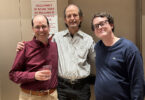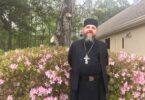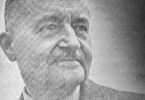Despite the German policies against cooperation or unity minded activities between the Orthodox Churches in the areas under their control, the Byelorussian and Ukrainian Autonomous Churches were in contact with, and cooperating with the ROCOR at every available opportunity. The Germans themselves assisted such cooperation with the ROCOR”s Council of Bishop which met in Vienna in October 1943, which was attended by representatives of both the Byelorussian and Ukrainian Autonomous Churches. The principal business of the Council was to condemn the election of Metropolitan Sergius (Stragorodskii) as uncanonical and null and void, as it violated procedures established at the All Russian Council of 1917-1918, as well as the fact that no other candidates were even allowed to be named. An Epistle was issued by the Council declaring the “election” as invalid. The Epistle was signed by all the Bishops present, and published in Pravoslavnaya Rus, then published by the Monastery of Saint Job of Pochaev in Ladomirova, Czechoslovakia, and Tserkovnaya Zhizn, then published in Belgrade, Yugoslavia, and in the secular press in various countries. [1]Woerl, M. Biography of Archbishop Gregory (Borishkevich) @ www.rocorstudies.org/test Bishop Sergei (Korolev), then Bishop of Prague, later stated that he did not sign the Epistle, but his name appeared as a signatory in the press. Bishop Sergey had followed Metropolitan Evlogy in schism from the ROCOR in 1926; he appeared at the 1943 Vienna Council due to the fact that all Orthodox in the “Reich” were under the jurisdiction of Metropolitan Seraphim (Lade) of Berlin and Central Europe, primarily as Metropolitan Seraphim was of German nationality. It should be noted that Metropolitan Seraphim allowed those who were forced into his jurisdiction to commemorate their own Church authorities (Bishop Sergey still commemorated Metropolitan Evlogy); it was a “live and let live” arrangement. [2]http://lib.pravmir.ru/library/author/130
Archbishop Venedikt (Bobkovskii) attended with Archimandrite Gregory (Borishkevich), a candidate for the Byelorussian Episcopate. Archimandrite Gregory was consecrated at the Council in Vienna as Bishop of Gomel, with all the Bishops attending concelebrating: Metropolitan Anastassy (Gribanovskii, 1873-1965), Metropolitan Seraphim (Lukianov, 1879-1959) of Paris & Western Europe, Metropolitan Seraphim (Lade, +1950) of Berlin & Central Europe, Bishop Sergei (Korolev) of Prague, Archbishop Venedikt of Grodno, Bishop Vasily (Pavlovsky, 1880-1945) of Vienna, and Bishop Philip (von Gardner, 1898-1984) of Potsdam. When Archbishop Venedikt and the newly consecrated Bishop Gregory returned to Byelorussia, Archbishop Venedikt asked Metropolitan Panteleimon to accept Bishop Gregory into the Episcopate of the Byelorussian Church, which was done by Synodal decree. [3]op. cit. 82,[4]op. cit. 56
In May 1944, the last Bishops Council of the Byelorussian Church in Byelorussia was held. Metropolitan Panteleimon, Archbishop Venedikt, Archbishop Filofei, Bishop Afanassy, Bishop Stefan, Bishop Pavel, Bishop John (Lavrinenko) of Brest, and the guest in Minsk of the Byelorussian Rada leader R. Ostrovsky, Metropolitan Alexander (Inozemtsev, 1887-1948, Bishop in the Polish Orthodox Church, one of the founders of the Ukrainian Autocephalous Church of the World War II era, died in Munich in 1948 under “mysterious & tragic circumstances.”) [5]http://zarubezhje.narod.ru/av/a_050.htm The Council was requested by the German Occupation authorities, who wanted further denunciations of the election of Patriarch Sergius in the Soviet Union. Metropolitan Panteleimon felt this was an ecclesiastical, not a political matter, but, they proceeded and came up with a statement, after long debate, that all sides could accept. [6]op. cit. 56
Other issues discussed were the further attempted intrusion into Church life by the Byelorussian Central Rada, made up of Byelorussian nationalists, and a creation of the Germans. The Bishops spoke clearly against all interference into Church life by the Rada. Metropolitan Panteleimon was given the title of “His Beatitude,” and two Dioceses-Brest and Pinsk-were added to the Byelorussian Church. The Council ended hurriedly, as the front lines of battle were quickly approaching. In July 1944, the Byelorussian Episcopate emigrated to Germany. [7]op. cit. 56
In December 1945, the Byelorussian Bishops who had emigrated to Germany, Metropolitan Panteleimon, Archbishop Venedikt, Archbishop Filofei, Bishop Afanassy, Bishop Stefan, Bishop Pavel, and Bishop Gregory met in Council to ponder their future. Metropolitan Panteleimon insisted that their only possible course of action would be to join the ROCOR. They did so in April 1946 at the Munich Council of Bishops. All the Bishops were accepted, except Bishop Pavel, who resented being questioned about alleged sympathies to Rome. He denied such sympathies, but subsequently joined the Roman Catholic Church. All the Byelorussian Bishops went on to eventually head various Dioceses of the ROCOR, except Metropolitan Panteleimon. [8]op. cit. 82,[9]Woerl, M. Biography of Bishop Pavel (Meletiev) @ www.rocorstudies.org/test
In the emigration, Metropolitan Panteleimon “headed Byelorussian parishes in the D.P. [Displaced Persons] Camps. He lived at the Schleissheim and Feldmoching D.P. Camps. He conducted an extensive correspondence with Russians in Germany, both those in the D.P. Camps, and those fortunate enough to have their own residences. Vladika Panteleimon was practically destitute, but “money came to him from all sides.” But, Vladika Metropolitan Panteleimon received gifts of money with one hand, and immediately gave it to those in need with the other. He often sold his own belongings to aid others. [10]http://drevo-info.ru/articles/16585.html
On Sunday, 11/24 Dec 1950, Vladika Panteleimon served the Divine Liturgy in the Church of the Archangel Michael in the Feldmohing D.P. Camp. After the Liturgy, he went to the “hut” where he lived with the sacristan of the Church of the Archangel Michael, Joseph Grinkevich. In the next room, Vladimir Grinenko lived with his wife. As always, Vladika visited the Grinenkos, and, he seemed “tired, but his eyes shone with the same childlike joy, kindness, and love.” [11]ibid.
On the eve of his repose, Metropolitan Panteleimon told two Bishops who visited that he was dying. A priest came early the next morning, and was with him until 2 in the afternoon. He spoke off and on with the priest, about Christ the Savior and the Holy Church, and seemed to become increasingly drowsy. After 2, a nurse checked the Metropolitan’s pulse, and it seemed fainter … nearly 6 in the evening, Archbishop Venedikt, who had been notified, began to read the Prayers for the Dying. By 6, Metropolitan Panteleimon had reposed, on 17/30 Dec 1950. The funeral was held three days later in the Feldmohing D.P. Camp. Priests came from all over Germany, and the funeral was served by Vladika Panteleimon”s longtime friend, Archbishop Venedikt. Metropolitan Panteleimon was buried in the Menhengov Cemetery. [12]ibid
References
| ↵1 | Woerl, M. Biography of Archbishop Gregory (Borishkevich) @ www.rocorstudies.org/test |
|---|---|
| ↵2 | http://lib.pravmir.ru/library/author/130 |
| ↵3 | op. cit. 82, |
| ↵4 | op. cit. 56 |
| ↵5 | http://zarubezhje.narod.ru/av/a_050.htm |
| ↵6 | op. cit. 56 |
| ↵7 | op. cit. 56 |
| ↵8 | op. cit. 82, |
| ↵9 | Woerl, M. Biography of Bishop Pavel (Meletiev) @ www.rocorstudies.org/test |
| ↵10 | http://drevo-info.ru/articles/16585.html |
| ↵11 | ibid. |
| ↵12 | ibid |










